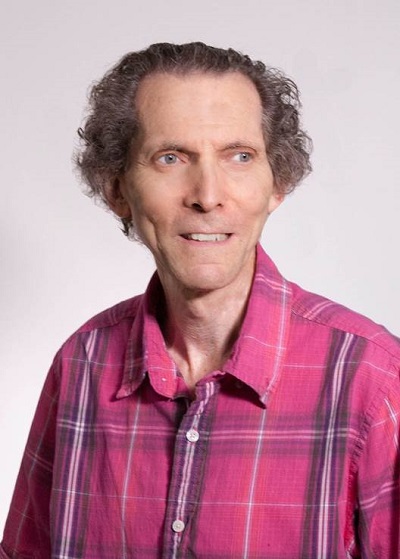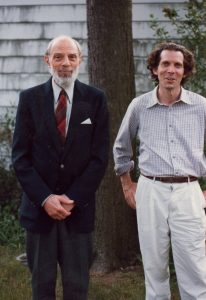ZEN MESTEREK ZEN MASTERS
« Zen főoldal
« vissza a Terebess Online nyitólapjára

Steve Antinoff (1949-)
Steve Antinoff was born in 1949. Questions he could not answer led him to train at a Zen
monastery in Kyoto. He stayed in Japan for many years. Later he lived in Rome. Along the
way he obtained a doctorate in religion. Currently he teaches philosophy and religion
at Philadelphia's University of the Arts.

Dr. Richard DeMartino with Dr. Steve Antinoff
PDF: Reports from the Zen Wars: The Impossible Rigor of a Questioning Life
2016, 288 pagesFour decades ago — aged twenty — the author experienced what he calls a “negative satori,” a fundamental and irrefutable realization not of enlightenment, but of himself as a predicament only enlightenment could resolve. This, shaped by the hammer blows of a singular American professor, Richard DeMartino, brought him to Zen, and to Japan. Yet over time, of far greater import than his bungling efforts were the wonderful occupants of the Zen world he encountered: Toyoshima-san, the meditation Prometheus whose superhuman efforts astounded and inspired all while he remained impaled on the cliff’s edge; the Thief, chief monastery monk who stole the world from whoever he encountered and whose yawns and the brushing of his teeth shot sparks of Absolute Meaning; Hisamatsu, the great lay Zen Master who at age 16 overheard a doctor tell his mother he’d be dead in six months, only to awaken ten years later and become the most delighted man in Japan; Bunko, the monk kind to others but ferocious with himself, whose daily state of Oneness in meditation left him dissatisfied because despite all exertion he could not crush it to pieces and break beyond it.
These are among the sitters for the portraits in Reports From the Zen Wars, Steve Antinoff’s attempt to bear witness to what for him has been The Greatest Show on Earth, price of admission one lotus position.
PDF: Spiritual Atheism
2010, 151 pagesOver the last 160 years, a great dilemma has been hatching out of Western spiritual consciousness. In our modern existence, we have lost faith in the traditional routes by which human beings have come to experience the Divine, and an acceptance of oneself as having a place in the order of the universe. In Spiritual Atheism, Steve Antinoff argues that the dilemma burning within the West has been given its most fundamental expression by Kirilov in Dostoyevsky’s The Possessed “God is necessary, and so must exist . . . Yet I know that he doesn’t exist, and can’t exist . . . But don’t you understand that a man with two such ideas cannot go on living?” According to Antinoff, spiritual atheism begins with three realizations: that our experience of ourselves and our world leaves us ultimately dissatisfied, that our dissatisfaction is intolerable and so must be broken through, and that there is no God. Continuing where such writers as Christopher Hitchens and Sam Harris left off, Antinoff’s unique and prescient take on deity and spirituality makes this book a critical contribution to the understanding of the quest for salvation and enlightenment in a world full of chaos and need.